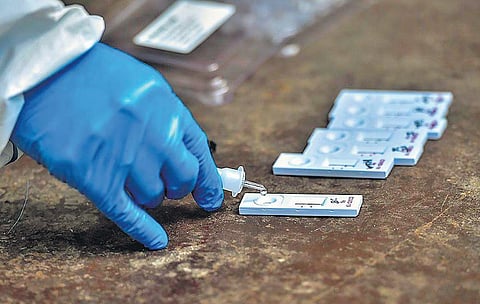

NEW DELHI: India has made post-arrival COVID-19 testing at the airport mandatory for travellers, irrespective of their vaccination status, coming from 'countries at risk' in addition to pre-departure testing undertaken 72 hours in advance.
The ‘at risk’ countries include Europe, the United Kingdom, and 11 other countries - South Africa, Brazil, Bangladesh, Botswana, China, Mauritius, New Zealand, Zimbabwe, Singapore, Hong Kong, and Israel.
According to a press statement issued by the Ministry of Health and Family Welfare relating to the updated 'Guidelines for International Arrivals' for passengers found positive in these tests, they will be isolated and treated as per the clinical management protocol and their samples will also be taken for Whole Genome Sequencing. The passengers found negative can depart the airport but have to undergo home isolation for 7 days, followed by repeat testing on the 8th day of arrival in India, followed by 7 days of self-monitoring.
The Centre had issued revised guidelines on November 28. These updated guidelines issued on Monday, which would come into effect on December 1, says that, further, in view of reports of an increasing number of countries reporting the Omicron variant, the present guidelines also mandate that 5% of travellers coming from countries that are not in the ‘at risk category’ will also be tested on a random basis at airports for COVID-19.
Samples of all individuals testing positive for COVID-19, either at airports under home isolation or during random sampling, will also be sent for Whole Genomic Sequencing at identified INSACOG network laboratories to determine the presence of SARS-CoV-2 variants (including Omicron).
The B.1.1.529 variant (Omicron) was first reported to WHO from South Africa on November 24 and the WHO’s Technical Advisory Group on SARS-CoV-2 Virus Evolution (TAG-VE) on November 26 has classified it as a Variant of Concern (VoC) in view of the large number of mutations noted in the variant, some of which may make it more transmissible and have immune escape behaviour. The emerging evidence on the issue is being monitored by the Union Ministry of Health.
States have also been advised to carry out rigorous surveillance of international passengers, enhanced testing, monitoring the hotspots of COVID-19, ensuring augmentation of health infrastructure, including undertaking samples for whole-genome sequencing.
While the Union Ministry of Health continues to closely follow the evolving nature of the pandemic, strict adherence to COVID appropriate behaviour (use of mask/face cover, physical distancing, hand hygiene and respiratory hygiene) and undertaking COVID-19 vaccination remain the mainstay for managing the outbreak at the community level.